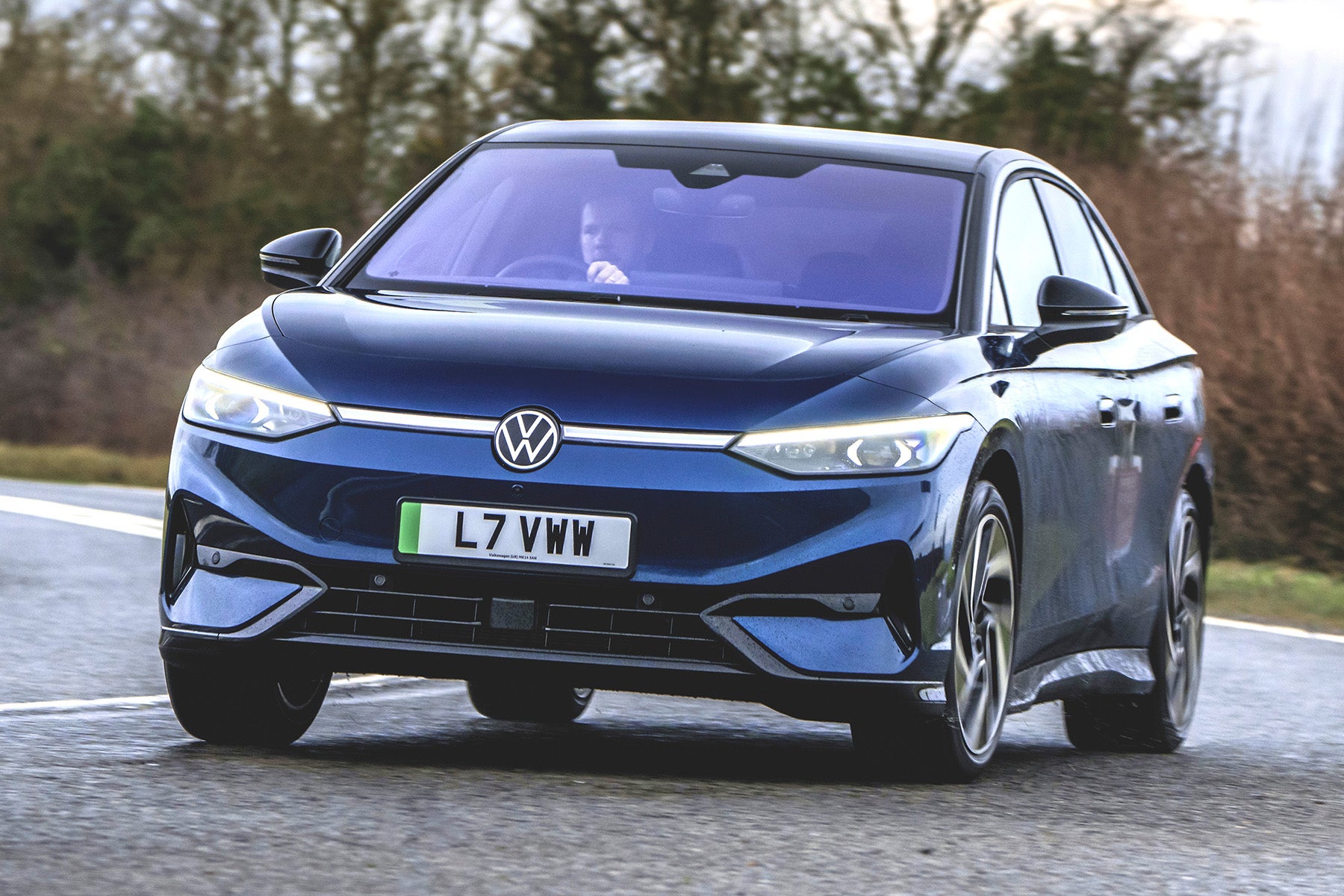Volkswagen ID.7 Review 2025: Price, specs & boot space
Written by Richard Aucock
- 2023
- Large family hatch
- Electric
Quick overview
Pros
- Luxurious and very sophisticated to drive
- Interior is spacious and practical
- Improved infotainment is easier to use
Cons
- Expensive in launch specification
- Touchscreen controls need familiarisation
- Limited choice of colours
Verdict: Is the Volkswagen ID.7 a good car?
“The Volkswagen ID.7 is the largest car in the electric VW ID range – and the best, most complete model that has been launched to date. It has a good range, ultra-refined performance and drives in a sophisticated, able way. With a super-practical interior and much-improved infotainment, it’s a great way for Volkswagen Passat drivers to switch to electric.”
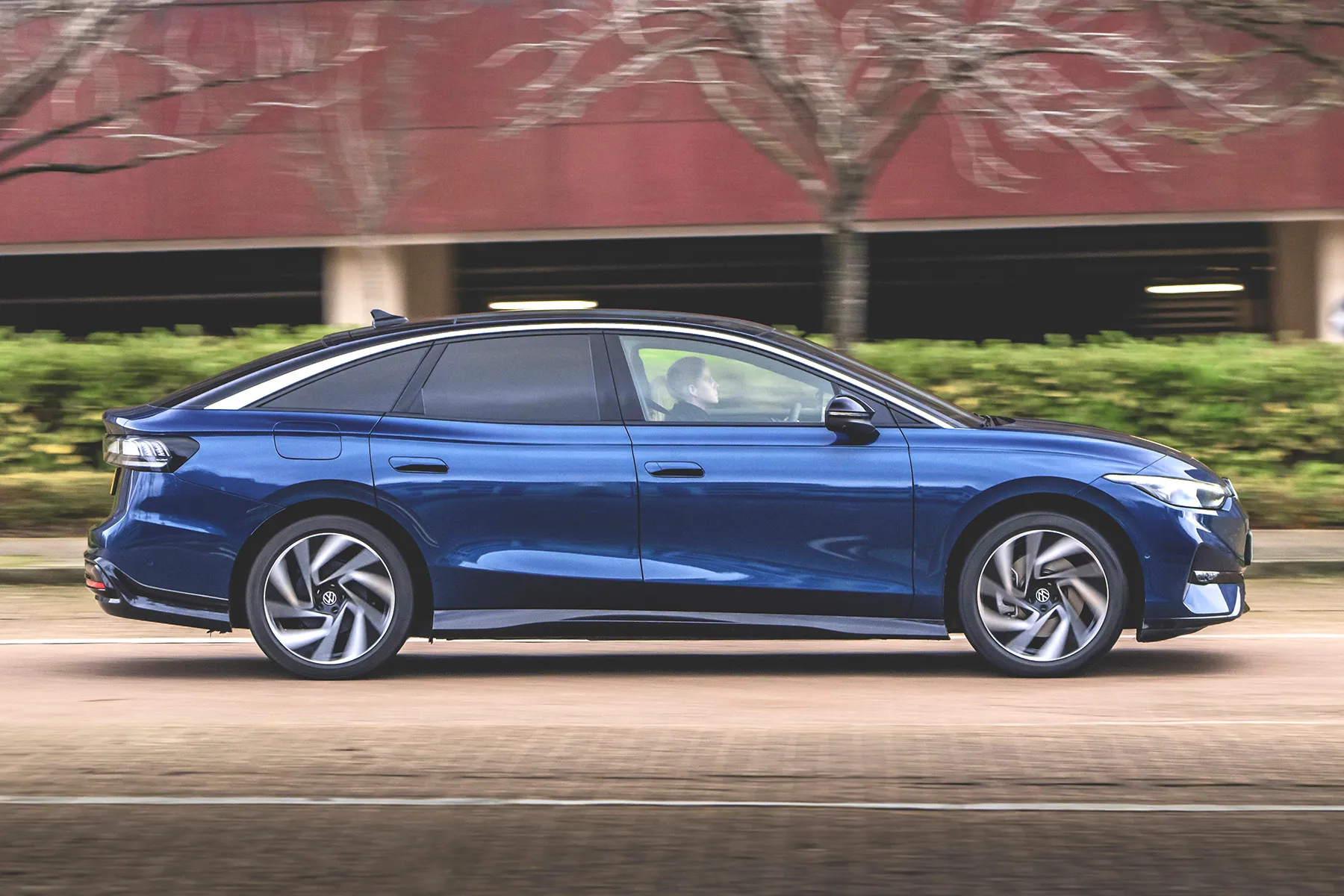
What is the new Volkswagen ID.7? Well, the Volkswagen Passat is one of the firm’s longest-running cars, having been around since the 1970s. It is a great business express – but these days, company car drivers need an electric car if they’re to make a tax-conscious, wallet-friendly choice. And there isn’t a fully-electric Passat yet. Enter the new Volkswagen ID.7: the range-topping model in VW’s ID electric car range.
It sits above the Volkswagen ID.3, the Volkswagen ID.4 and the Volkswagen ID.5, offering a level of space that can better them all. Indeed, it’s even more practical than the equivalent Volkswagen Passat, thanks to its space-efficient EV underpinnings – and comes as standard with a useful hatchback. If you still need more space, there's a ID.7 Tourer as well with an even bigger boot.
With the Volkswagen ID.7, the company really has gone to town. With a fresh design of electric motor, an extensively-overhauled infotainment system and a renewed focus on quality and refinement, it’s a marked step up. The car is a genuine premium-grade competitor to rivals such as the BMW i4.
What’s more, if dealers can get Tesla Model 3 drivers behind the wheel for a test drive, they’ll be amazed at the level of sophistication delivered by the new Volkswagen ID.7. Battery range is up to scratch too, with 379 miles in the cheapest variant and up to 433 miles in the 86kWh Pro S Match Plus, though you’ll take a range hit with the sporty GTX.
New Volkswagen ID.7 prices are a little high but more affordable variants will come later. The Pro S battery will be more expensive as well, particularly compared to a Tesla Model 3 Long Range. Call it Volkswagen’s ‘reassuringly expensive’ approach to pricing…
Overall, the new Volkswagen ID.7 is a great choice for those seeking a grown-up electric car, one that’s as well-rounded as a regular VW, just with the future-ready appeal of a pure electric drivetrain. Some electric cars can lack that final bit of polish, but not the new Volkswagen ID.7. It’s a tantalising taste of what’s to come from the marque’s electric cars.
Looking for a used car for sale? We've got 100s of Volkswagen Approved Used Cars for Sale for you to choose from, including a wide range of VW ID.7 cars for sale.
Is the Volkswagen ID.7 right for you?
The new Volkswagen ID.7 is a great choice for those who want a car that feels as well-honed as, say, a Volkswagen Passat. It has a feeling of polish and deeply-ingrained engineering excellence that should prove very reassuring over the long run.
There are other benefits as well, such as the surprisingly roomy interior and almost luxury car levels of interior refinement. Those who have been infuriated by earlier iterations of Volkswagen’s latest infotainment system will be pleased to discover fundamental improvements here, too.
You will pay more for a new Volkswagen ID.7 than a Tesla Model 3 – even the range-topping Long Range Dual Motor version. But you can really feel the difference in terms of completeness and refinement. For high-mileage drivers, the maturity of the Volkswagen ID.7 will deliver a sense of wellbeing on every journey.
Thanks to today’s extremely beneficial Benefit-in-Kind company car tax rules, the new Volkswagen ID.7 may certainly be for you if your employer favours VWs in its company car policy. You’ll save an absolute fortune in tax compared to a petrol- or diesel-powered Volkswagen Passat.
If you need more practicality than the ID.7 can offer, Volkswagen also has an ID.7 Tourer estate, with prices only a little more than those of the saloon.
What other cars are similar to the Volkswagen ID.7?
The Volkswagen ID.7 faces stern competition from the formidable Tesla Model 3. The latter is a slightly smaller car on the outside, but counters this with a considerably lower price – the Model 3 range starts from around £11,000 less than the ID.7.
Another company car favourite, the BMW i4, provides similar business-friendly vibes to the Volkswagen ID.7 and starts at a similar price point, despite BMW’s arguably more prestigious badge (though it’s a slightly less accommodating car than the large ID.7), as does the sleek BYD Seal, and the Hyundai Ioniq 6. All have a fastback-style appearance (though some still use traditional boots rather than hatchbacks), and compared to SUVs, this offers benefits in terms of battery range and refinement.
Of course, if you’re not yet ready to go electric, there’s a new Volkswagen Passat in showrooms as well. This is offered in petrol and plug-in hybrid forms, the latter with a generous electric range of more than 60 miles. The perfect EV-style stepping stone to buying a new Volkswagen ID.7 in the future, perhaps?
Comfort and design: Volkswagen ID.7 interior
“The Volkswagen ID.7 has a smart, tactile interior that shows VW has heeded the criticism levelled at early Volkswagen ID.3 models. It has a quality feel and appealing materials, particularly in this upscale Launch Edition spec.”
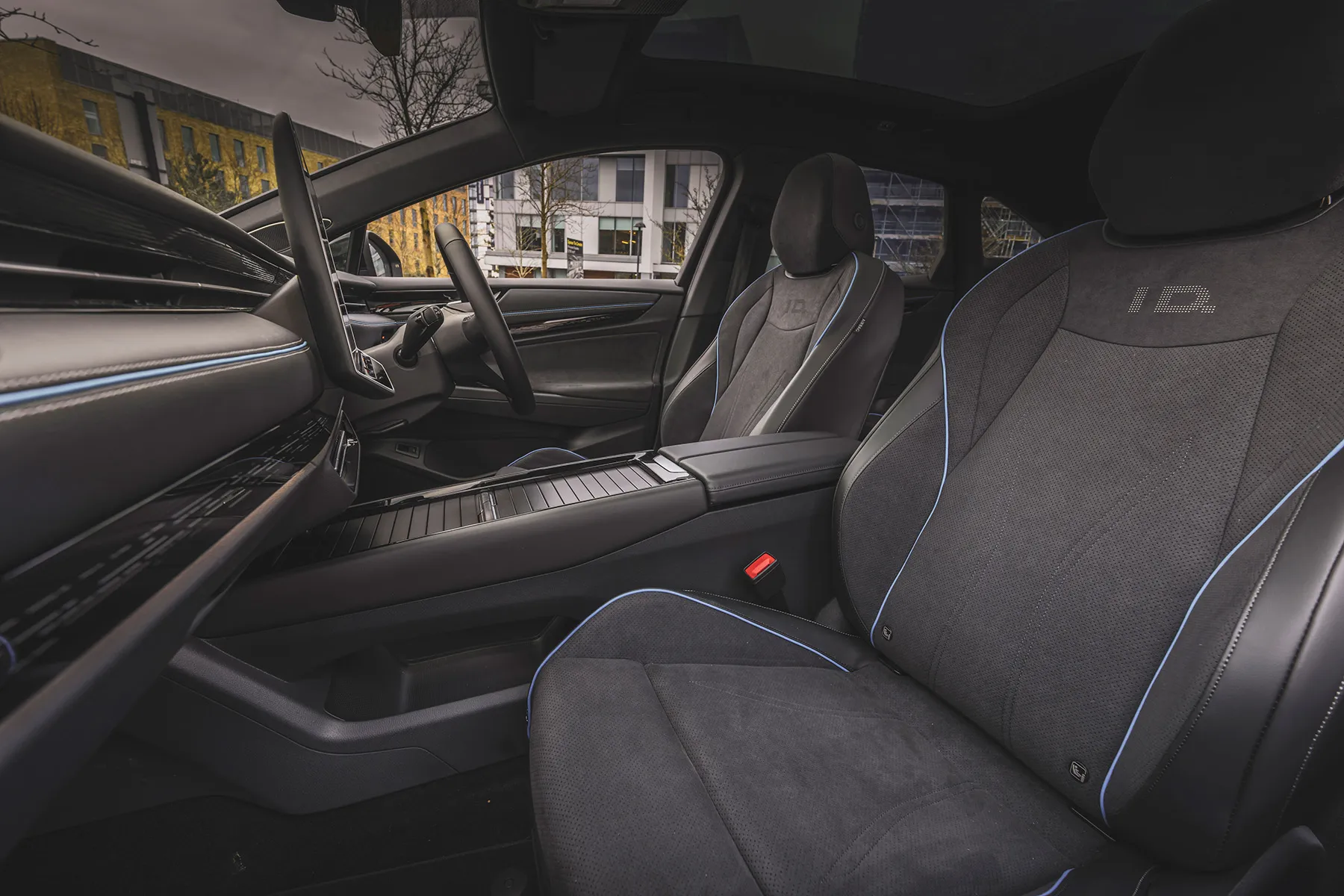
The interior of the new Volkswagen ID.7 has a sophisticated, modern feel that makes it feel a bit livelier and more exciting than an equivalent Volkswagen Passat. In common with other modern VWs, most of the buttons have been removed, with the touchscreen taking over control duties. The illuminated patterns of the multi-colour ambient lighting strips on the dashboard add to the futuristic appearance.
Pleasingly, the heater controllers and volume slider at the bottom of the infotainment screen are now illuminated as well – although it remains infuriatingly easy to accidentally turn up the stereo or alter the volume while you’re resting your hand there as you scroll through the infotainment settings.
The Volkswagen ID.7 has firm, supportive seats that, in our test car, were optional ergoActive chairs – backed by the German campaign for healthier backs (yes, really). We felt we could happily sit in them all day long, and high-mileage company car drivers will love these excellent seats as well.
Volkswagen has updated the controls on the new ID.7. On the right side of the steering wheel is an improved drive switch, which you twist forwards to engage drive, backwards for reverse, and press a button on the end for park.
On the left side is an indicator stalk that now includes auto wiper functions. A little thumbwheel allows you to alter the speed of the standard automatic wipers – or set them to continuous wipe if you prefer.
This frees up space on the centre console for a large, wide cubby that is well-shaped and practical to use. Below it is additional useful storage space.
Quality and finish
We are very impressed with the interior quality of the new Volkswagen ID.7. Compared to the plasticky feel in the first Volkswagen ID.3, it seems much more upmarket – much like a Volkswagen Passat, in fact.
There are soft-touch plastics instead of hard, scratchy surfaces and the fancy stitched dash top of the plush Launch Edition wouldn’t look out of place in an Audi. All the surfaces are well-finished, and while there are harder plastics lower down the dashboard, they are still robust and seem built to last.
Being a Volkswagen, the ID.7 has smooth panel gaps on the outside and a deep, lustrous paint finish. The doors shut with a solid ‘thunk’ and even the door stays are well-engineered – so you’re a little less likely to bang the door into a car parked tightly next to you at the supermarket.
Infotainment: Touchscreen, USB, sat nav and stereo in the Volkswagen ID.7
The Volkswagen ID.7 has a comprehensively overhauled infotainment system, aimed at righting the wrongs of models such as the Volkswagen ID.3 and Volkswagen Golf. It is far larger, measuring 15.0 inches, and this extra visual real estate has allowed the designers to optimise the layout and make it easier to use.
There are two ‘fixed’ strips. At the bottom, the temperature and ventilation settings are permanently displayed, including icons for the climate control seats. At the top, there are shortcut keys to the car control centre, which other settings, such as a shortcut to Spotify, can be customised to be permanently on display.
The main area of the infotainment touchscreen has a tile layout that, again, is customisable. It’s much more logical and natural to use than the old VW system, and a faster processor means swiping between displays is a lot quicker. There’s also the IDA natural language voice assistant: say “Hey Ida” and she will help you out, although we found she was far from infallible.
There is also a display in front of the driver – a super-slim rectangle showing only the most important information and nothing else. It’s a high-res, colourful screen, and we rather liked its simplicity.
The Volkswagen ID.7 has wireless smartphone charging, plus Apple CarPlay and Android Auto connectivity via the touchscreen. Along with the standard nine-speaker sound system, an optional 700W Harman Kardon 12-speaker setup is available.
A clever added extra is the Discover Pro Max sat-nav system. This uses an augmented reality head-up display to deliver turn-by-turn arrows to the driver without them having to look at the central display. Because the sat-nav system is built in, it can use sensors in the car to offer lane-level navigation, directing the driver into exactly the right lane on a motorway with ease.
Space and practicality: Volkswagen ID.7 boot space
The Volkswagen ID.7 is a long car, measuring nearly five metres in length. It also has a wheelbase nearly three metres long, with very short front and rear overhangs. All this adds up to a very roomy and spacious interior indeed.
The front seats are mounted high, and wide door openings mean they’re easy to step in and out of. The driver’s seat has a seemingly endless range of adjustment, meaning all shapes and sizes should be able to get comfortable. Those in the front will enjoy a commanding feel, although the steeply-angled windscreen pillars do create a few blind spots at junctions.
In the rear, the Volkswagen ID.7 is outstanding. The rear seat itself is very supportive and comfortable, and feels like a ‘proper’ seat rather than a three-quarter-sized bench. What’s more, there’s a huge amount of legroom – it’s almost limo-like – and despite the Launch Edition having a standard panoramic glass roof, headroom is excellent.
The new Volkswagen ID.7 has a hatchback boot with a huge opening. Electric operation makes it easy to use, as does the sheer width and length of the luggage area. It measures 532 litres with the seats up, and 1586 litres with them folded.
The Volkswagen ID.7 doesn’t have a front boot, or so-called ‘frunk’. Instead, the charging cables are stowed in a cubby beneath the boot floor.
Handling and ride quality: What is the Volkswagen ID.7 like to drive?
“The Volkswagen ID.7 drives impeccably well, with mature, well-honed manners and a level of sophistication that elevates it from a mainstream car into one that competes with premium brands.”
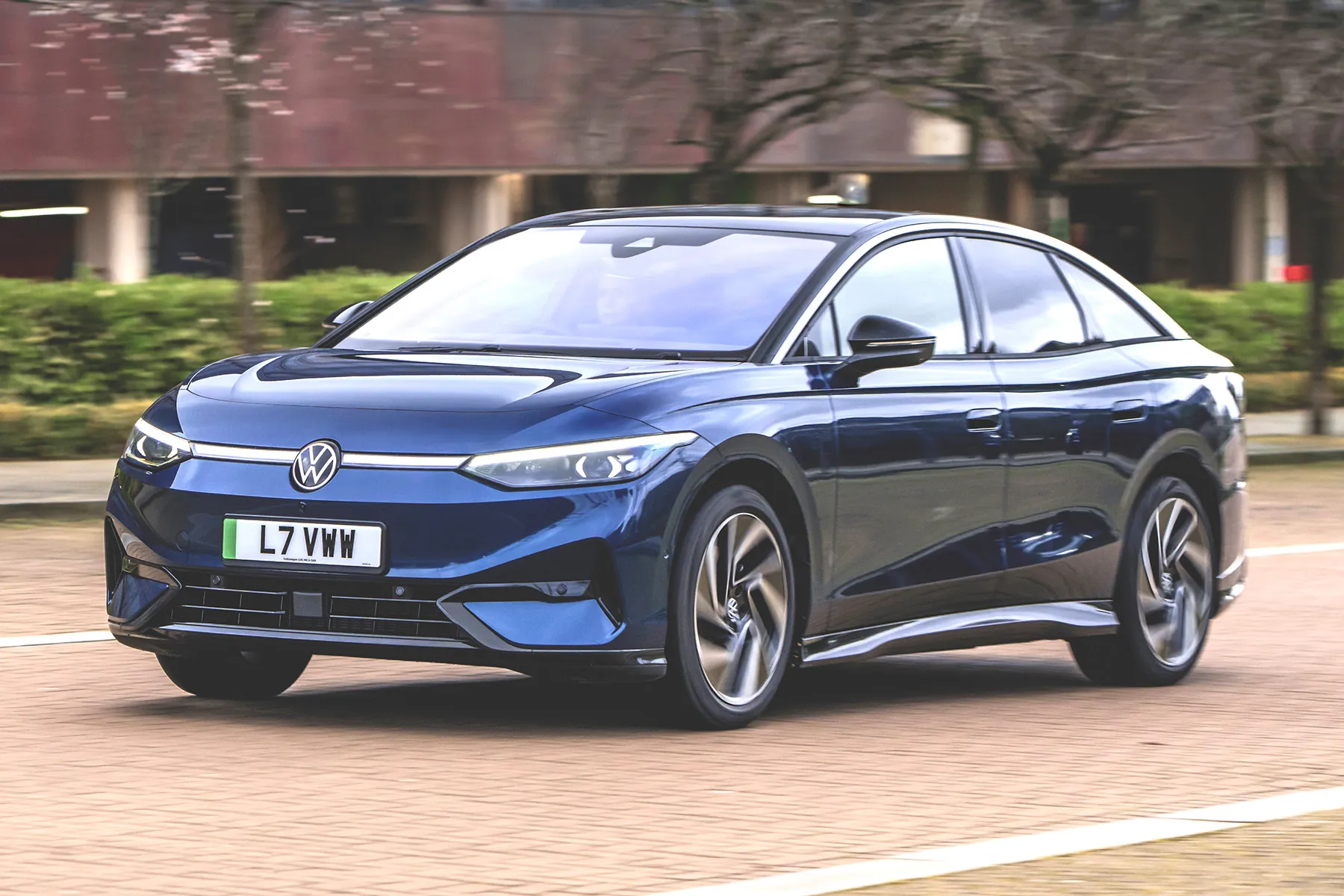
The Volkswagen ID.7 is an impressive car to drive. It provides a feeling of confidence behind the wheel, with the well-weighted steering responding faithfully to your inputs, plus a solid chassis giving a sense of deep-down robustness. You feel the Volkswagen ID.7 could take on even the roughest roads and remain cool, calm and collected.
It feels in its element when cruising at high speeds, where stability is excellent and the car feels very natural and settled. The driver can sit back and relax, not only because the car does all the hard work for them, but also because they have a clear connection with it.
There are two types of suspension: a regular setup and a DCC option with adaptive chassis control. For the latter, the electronic dampers have a choice of comfort and sport modes, and also an individual setup where the driver can choose from 15 increments between comfort and sport.
In normal mode, the suspension is beautifully supple, with soft, flowing dynamics that glide gently along. For those who want a bit more control, sport mode tightens up the body control but still retains the impressive comfort, with the Volkswagen ID.7 generally soaking up bumps well, even on the larger 20-inch alloy wheels. The elegant, high-end way the Volkswagen ID.7 drives is definitely a stand-out for us.
We’ve got a separate full review on the ID.7 GTX, but in brief it’s closer to the regular ID.7 in character than the sports saloon you might be expecting; its ride and handling balance still falls on the side of ride quality. It’s grippy but not really involving, and not one of the quicker performance EVs either.
What motors and batteries are available in the Volkswagen ID.7?
The Volkswagen ID.7 currently comes with a single electric motor combined with a choice of two batteries.
The ID.7 Pro uses a 77kWh battery that gives it a range of up to 379 miles according to official figures. The ID.7 Pro S, meanwhile, uses a large 86kWh battery to increase that range to 433 miles, while the GTX drops back down to 364 miles with the same 86kWh battery pack - as it has not one, but two electric motors.
The electric motor in Pro Match Plus and Pro S Match Plus models produces 286PS and drives the rear wheels via a single-speed gearbox. Acceleration is swift, accelerating to 62mph in 6.5 seconds in the ID.7 Pro Match Plus and 6.6 seconds in the ID.7 Pro S Match Plus. It's not as intensively speedy as a Tesla Model 3, but it feels fast enough. If you want more performance, then the dual-motor, 340PS GTX is the one to go for, though its 5.4-second 0-62mph time still isn’t in the real big leagues as far as electric cars go.
The Volkswagen ID.7 delivers its power in a very serene way, with measured, precise acceleration that again contrasts with the fireworks you get in a Tesla. Traction at the rear wheels is good, so you can use the power without fear of the wheels slipping and the traction control cutting in.
Top speed is electronically limited to 112mph. The idea here is to preserve battery range at higher speeds, but it is an irrelevance in the UK anyway.
Refinement and noise levels
Refinement is exceptional in the Volkswagen ID.7, with uncannily low noise levels at most speeds. Because the electric motor is mounted on the rear axle, any EV whine is imperceptible, meaning the car accelerates in glide-along silence.
This experience is, at first, almost uncanny, because speeds are rising in the Volkswagen ID.7, yet noise levels are not. And it remains quiet at higher speeds, with a striking absence of wind noise and tyre roar kept well at bay.
The Volkswagen ID.7 is even refined over bumps, with none of the thudding clonks and bangs you sometimes get from other cars. Refinement really is one of the vehicle’s standout qualities, and we guarantee you will be impressed.
Safety equipment: How safe is the Volkswagen ID.7?
The Volkswagen ID.7 has a broad range of standard safety equipment. A key feature is the enhanced Travel Assist package, which gives forward and sideways active safety support, and also helps centre the car in its lane. Individual features of the Travel Assist tech can be switched off through the touchscreen – and it is now easier to do this.
Cleverly, Travel Assist also now uses swarm data from other road users. It needs just one identified road lane marking to keep the vehicle centred on the road. This also means the system works more smoothly and reliably (so owners will be less likely to turn it off).
Assisted lane changing will semi-autonomously change lane if the driver indicates and, at the end of a journey, an exit warning system warns occupants if something is approaching from behind. If it detects a car or bicycle getting close, it can delay door opening thanks to the electronic door latches.
The Volkswagen ID.7 has been awarded a maximum five-star rating in independent Euro NCAP crash tests.
Volkswagen ID.7 charging times: How much does it cost to charge?
“The Volkswagen ID.7 promises excellent efficiency at motorway speeds thanks to its excellent aerodynamics – the wind-cheating shape means less energy is used to push it through the air, meaning it will cost less to recharge on the move.”
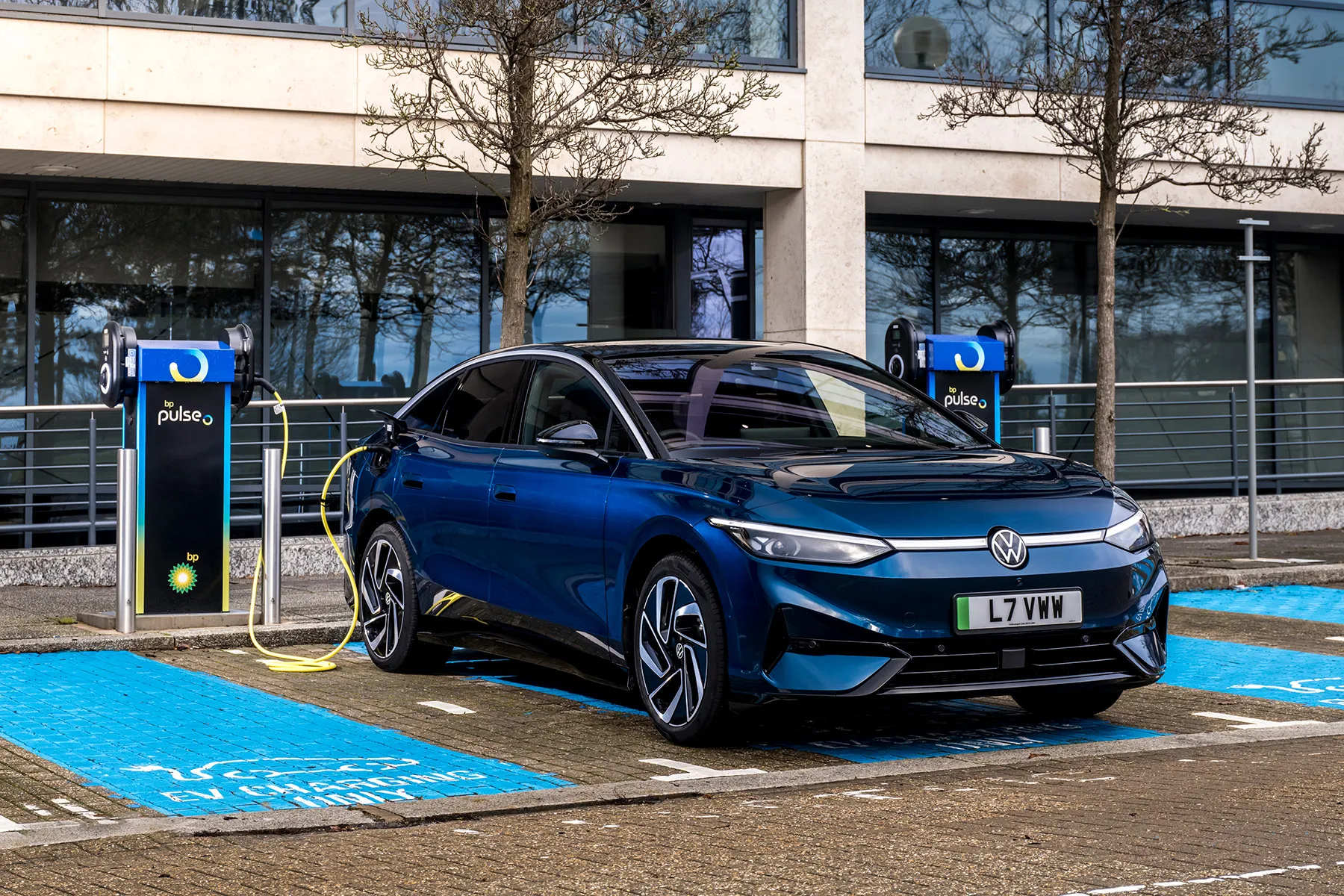
The Volkswagen ID.7 Pro’s 77kWh battery provides an official range of 379 miles (381 miles in pre-’Plus’ models) while the 86kWh battery in the ID.7 Pro S gives you up to 433 miles (previously 437), which makes it one of the longest-range electric cars you can buy. The GTX, with its more powerful dual-motor setup, drops quite a bit of range despite its 86kWh battery pack, to 364 miles (365 before the Plus updates).
If you need to travel further, the Volkswagen ID.7 can be charged using public rapid chargers at speeds of up to 175kW. That means – if you can find a punchy enough charger – you can add 125 miles of range in as little as 10 minutes. That could be a game-changer for anyone looking to travel long distances in an electric car.
The most frugal way to charge a Volkswagen ID.7 will be by plugging it at home. Depending on your home electricity tariff, expect to pay somewhere in the region of £20 for a full charge of the ID.7.
Volkswagen ID.7 reliability and warranty
It’s too soon to say how reliable the new Volkswagen ID.7 is. However, it is based on the well-honed VW MEB architecture, which is proving to be robust and dependable in service.
One influential test organisation has covered more than 60,000 miles in a Volkswagen MEB car, with no problems and a negligible decline in battery life, despite frequent fast-charging to maximum capacity.
The Volkswagen ID.7 will benefit from ongoing development and EV-specific optimisations, with further ability to fix reliability niggles before they become an issue via over-the-air software updates.
Volkswagen ID.7 insurance groups and costs
Insurance spans groups 38-42 with the Volkswagen ID.7, putting it in a similar bracket to many rivals, and quite a bit cheaper than the groups 48-50 of a BYD Seal (the Chinese car is unusually expensive on insurance in this class). While electric cars are more expensive to insure than conventional cars, Volkswagen’s reputation for reliability and customer service should help keep costs in check.
The Volkswagen ID.7 has a three-year / 60,000-mile warranty. For added reassurance, it also has an eight-year warranty for the battery, which is valid for 100,000 miles. Perfect for high-mileage company car drivers, then.
VED car tax: What is the annual road tax on a Volkswagen ID.7?
If you’re buying a brand new Volkswagen ID.7, then by the time you read this you’ve missed out on the opportunity for really cheap tax. The £10 first-year charge doesn’t sound so bad, but since all EVs are now subject to the standard rate (£195) and the ID.7 comfortably costs more than the £40,000 ‘expensive car’ surcharge, you’ll now pay £620 a year from the second year of registration, to the sixth year.
Existing ID.7 owners, or used buyers do get some respite from the surcharge though: Cars registered before April 2025 will only pay the £195 standard rate and not the surcharge; perhaps a great reason for picking up a used car, in addition to their lower prices.
Volkswagen ID.7 price
"The Volkswagen ID.7 currently starts at £51,005. That looks pretty punchy against the £40,000 Tesla Model 3 or £46,000 BYD Seal."
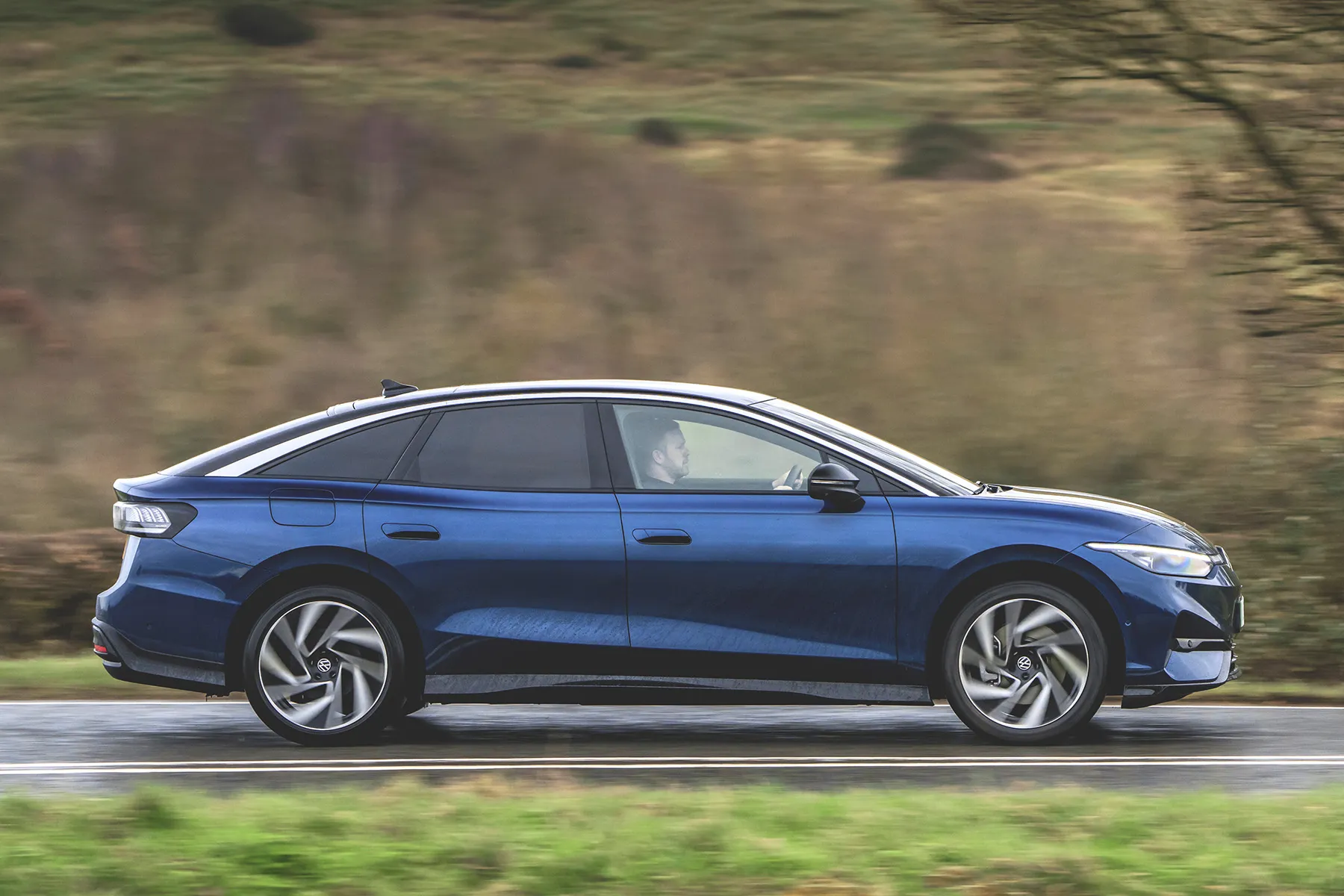
With the recent update to ‘Plus’ trim levels, Volkswagen has shaved a small but welcome £500 or so from the list price of each version of the ID.7. The Pro Match Plus starts at £51,005, with the Pro S Match Plus at £54,490 with its larger battery, and the GTX Plus 4Motion beginning at £59,025. Those figures are fairly high by the standards of the class, considering a Tesla Model 3 starts at under £40,000, and even the BYD Seal (around £46,000) and Hyundai Ioniq 6 (from £47,000) undercut it by several thousand. The VW is closer to the £51,000 tag on a BMW i4.
For this reason, you might want to consider used and nearly-new Volkswagen ID.7s, which can save you tens of thousands thanks to relatively steep depreciation. 2024 Launch Edition cars with 10-20k miles start at around £33,000 with the 77kWh battery pack and 86kWh cars with only 5000 miles in the mid-£40k range, around £10,000 cheaper than a new one.
Trim levels and standard equipment
When the ID.7 launched it was available in just one trim level, Pro Match, with a series of options and a couple of battery sizes. VW later introduced Pro S Match, with an 86kWh battery pack, and GTX 4Motion, a dual-motor model with the 86kWh battery and greater performance.
These have now been replaced by ‘Plus’ versions of each - so Pro Match Plus, Pro S Match Plus, and GTX Plus 4Motion. The names are pretty daft but you get the same drivetrain options, a little more kit, and slightly cheaper prices, so it’s difficult to complain.
Pro Match comes with 19-inch alloy wheels wearing aero trims, LED matrix headlights, illuminated front and rear emblems, microfleece ‘Comfort’ seats, ambient lighting, power-adjustable lumbar and massaging front seats, a 15-inch infotainment display and nine-speaker audio, heated front seats, an electric tailgate, and a heat pump.
Pro S Match is differentiated by its larger battery and… that’s basically it. The rest of the car’s kit is largely identical. GTX Plus 4Motion has more profound changes, with the same battery but an extra motor, plus 20-inch wheels (and an option for 21-inch wheels), heated front and rear seats, adaptive chassis control with different driving modes, 12-speaker Harman Kardon audio, heated front and rear seats, ventilated front seats, and red interior trim elements.
Ask the heycar experts: common questions
What is the difference between the Volkswagen ID.7 Pro and Pro S?
What is the range of the new Volkswagen ID.7?
Where are the motor and battery in the Volkswagen ID.7?
Get our latest advice, news and offers
Keep me updated by email with the latest advice, news and offers from heycar.
By submitting you agree to our privacy policy
